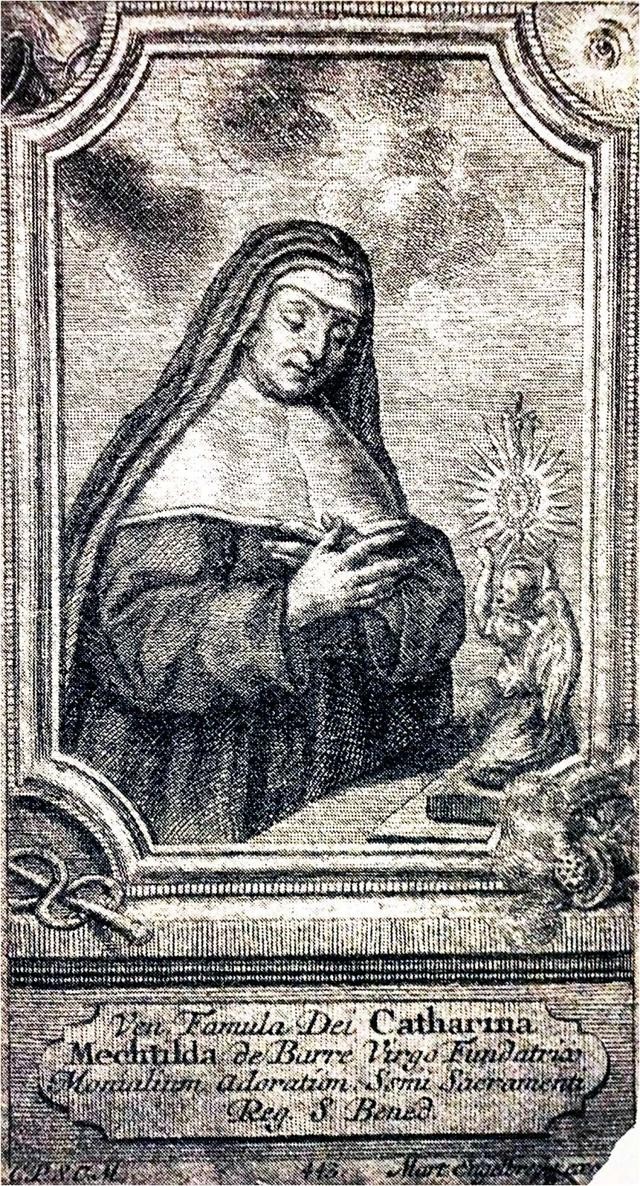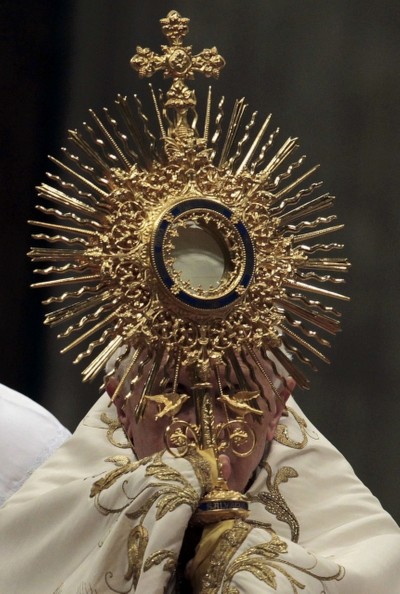On the Solemnity of Thursday, Part II: Sons of the Host
We at Vultus Christi are gradually going through Mother Mectilde’s conference ‘On the Solemnity of Thursday’. The conference was originally published in The Mystery of Incomprehensible Love, the first book in English by or about Mother Mectilde.
This is the second post in the series. You can read the first one here.
In this second portion, Mother Mectilde touches upon a favorite theme of hers, that the Benedictines of Perpetual Adoration are themselves sacrificial victims in union with the Host, a victimhood which is recalled every Thursday. Because of this they ought ever to overflow with gratitude.
The Text: Thursday, a Day of Pascha
For the victims of the Holy Sacrament, Thursday must be a day of Pascha, a day of solemnity and of rejoicing. This day is so abundant in graces that one can say that it exhausts all that Our Lord Jesus Christ is and can do. What more can He do after the institution of the divine Eucharist? What is there that is not [contained] in this august mystery?
Meditation: Children of the Host
A Thursday of Reparation

This little portion of the text is so rich that it would be impossible to comment on more in the space available. Yet there is no need to comment on more: this little section contains the perfect thoughts to accompany us today. Today, on the anniversary of the birth of St Thérèse, we at the monastery of Our Lady of the Cenacle are celebrating our monthly Thursday of Reparation.
The tradition of having the first Thursday of the month as a day dedicated to reparation comes to us from the Mectildean tradition. Following this tradition, we take the first Thursday of every month to make reparation for all the indignities, negligences, and offenses that the Most Blessed Sacrament has suffered, especially in the last month. While on a normal Thursday we would celebrate the Office and Mass of the Most Blessed Sacrament, on first Thursdays, we celebrate the Office and Mass of Reparation, so that we may better direct our weekly adoration to reparation. The Office and Mass deserve a commentary of their own, but we reserve that for another time.
Two words especially jump out of this passage that help to elucidate this mission of reparation. These words are victims and Pascha.
Reparation and Sacrifice
In recent times, much of the reflection on the subject of reparation has been in the context of the revelations of the Sacred Heart to St Margaret Mary Alaquoque. Attention to the practice of reparation also received a special impetus through the visions of Fatima. St Margaret Mary’s revelations about reparation to the Sacred Heart appeared before Mother Mectilde’s death in 1698, and yet Mother Mectilde’s theology of reparation was already well-formed before these revelations. Mother Mectilde situates her thoughts squarely within the sacrificial context of the Scriptures and Holy Mass.
For Mother Mectilde, reparation is especially accomplished by being joined to Jesus in His sacrificial victimhood. Jesus is the fulfilment of all the sacrifices of the Old Law. He was made a Victim for sin Who knew no sin (cf 2 Cor 5:21);, He is the Sacrifice of Praise spoken of in Psalm 115(116), and through Him we too offer our sacrifice of praise (cf Heb 13:15). For Mother Mectilde, reparation is always in this sacrificial context. It is the entrance of a soul into the victimal states of Christ made present through the Most Blessed Sacrament.
It is, then, most fitting that today’s portion of this text should speak of victims.
A Clarification for Modern Times
When this text was published, it was judged expedient to add an explanatory note about this word. We quote from it in part:
In the second paragraph [of this text], Mother Mectilde speaks of “the victims of the Holy Sacrament,” referring to herself and her fellow Benedictines of perpetual adoration. The word victim frightens some people…what exactly does she mean?
First of all, she uses it as the proper title of those who are vowed to adoration of the Most Holy Sacrament under the Rule of Saint Benedict in her Institute….
Secondly, she uses the word victim in the same way the texts of the sacred liturgy use it. One could cite here any number of Secrets and Postcommunions from both the Temporal and Sanctoral Masses. A victim is a living being made over to God alone in so radical and irrevocable a way that she no longer has any life outside of life in God… The liturgical use of the term victim makes it very clear that this is the ordinary state of anyone who receives Holy Communion consciously and devoutly. By being atoned (at-oned, joined) to the Divine Victim, the Lamb of God, one becomes a single victim with Him, that is, an offering made over to the Father in a holocaust of love.
The Proper Title of Those Vowed to Adoration
Mother Mectilde gave a peculiar name to the Benedictine Nuns of Perpetual Adoration. She called them Daughters of the Host. When the clarification above mentions “victim” as the proper title of those vowed to adoration of the Most Blessed Sacrament, it must be read in the context of this title.
We at the monastery of Our Lady of the Cenacle have adapted this title. Like Mother Mectilde’s spiritual daughters, we are known as “Sons of the Host.”
The Meaning of the Word Host
The key to understanding this phrase is to know what the English word host means. It does not mean here someone who hosts another! So what is a host? Hostia is Latin for Sacrificial Victim, as Jesus became when He offered Himself in fulfilment of the sacrifices of old. Thus Mother Mectilde is saying that she and her religious daughters are “Daughters of the Sacrificial Victim”, and this means that they looked to the Eucharistic Host, the Eucharistic Victim as their Father.
What It Means to be a Child
We can understand this better if we look at our own experience of fathers.
A Child is like His Father
A young child is like his father. A father passes down his own nature and a resemblance to his son or daughter by generation, and by education, his children receive a resemblance of habit to him–mannerisms, thought patterns, even talents and abilities.
So a child is like his father in nature, imitates his father, and takes after him. This is so even to the extent that the child bears the name of his father.
A Child is Poor; Has All He Has through His Parents
If the child is young, the child has nothing of his own. The child has all he possesses through his father. The child is very simple in this. There is no shame in having all his possessions through another. He feels his father’s possessions are his own. He is not ashamed to have nothing that is not his father’s.
A Father Looks After and Protects His Child
For the father’s part, he watches over the child, protects him, nurtures him, trains him, and helps him to mature into a strong and loving man.
The Victim of the Altar as “Father”
So it is for the Sons and Daughters of the Host, the Sons and Daughters of the Sacrificial Victim of the Altar.
We look to the Host as to our Father, and this is so that He can transform us, make us by grace What He is by Nature.
And What is He?
He is the Son of God, and, in Him we become sons of God. On the Altar, He is Victim offered to the Father, Sacrifice to God. And this too we become when we recognize ourselves as sons in Him. When we become truly the Sons of the Host, then we become truly Sacrificial victims offered to God with Him on the Altar.
Jesus as Father?
It must strike some as odd that Mother Mectilde thinks as Jesus as Father. We are used to reserving this title to God the Father. And God the Father is not the Son, nor is God the Son the Father. Therefore God the Son is Son, not Father.
This is certainly true, in the Trinity. And while, in the Trinity, the Father alone is Father, and the Son likewise is Son, exhausting all Sonship in the Trinity, nonetheless, as regards creation, all Three Persons are rightly referred to as Father. So, for instance, the Holy Spirit is called the “Father of the Poor” in the Golden Sequence of Pentecost, and the Son is called the “Father of the World to come.”
Moreover, Jesus Himself referred to Himself in a way that implicitly indicates fatherhood when He called His Apostles “Little Children” in His Last Supper discourse in St John’s Gospel. In numerous private revelations, too, such as in His messages to St Faustina, Jesus calls the one to whom He is speaking His “Beloved Daughter”.
But we need look no further than the Rule of St Benedict to see why Mother Mectilde looks to Jesus as Father. The Abbot is believed to act in the place of Christ in the monastery, “since he is called by His title. For the Apostle writes: You have received the spirit of the adoption of sons, in which we cry: Abba, Father.” Notice that for St Benedict, Christ is the Father of the monastery. Mother Mectilde does no more than specify that, for Benedictines of Perpetual Adoration, Christ-made-Eucharist is the Father of the monastery.
Children are like their Father
If Jesus is the Father of the monastery, and it is Jesus-Host, Jesus the Sacramental Victim, Who is the Father of Benedictines of the Most Blessed Sacrament, then it follows that the Benedictine of the Most Blessed Sacrament must be like Jesus the Sacramental Host. The Rule of the Master, believed by most commentators to be a source our Holy Father Benedict had before him when writing his Rule, puts it this way:
He who resembles. his father not only in appearance but also in conduct is a true son.
The vocation of the Benedictine of Perpetual Adoration is the Vocation of the Host. So, then, it is a vocation to resemble our Father-the-Host as nearly as possible, or, in the words of Mother Mectilde, the Benedictine of Perpetual Adoration
must study and observe so exactly the states and dispositions [Jesus] has there [in the Most Blessed Sacrament] so that not a single moment passes in which [the Benedictine of Perpetual Adoration] does not honour one of them, either through likeness or by tending toward it through love and union. We have said elsewhere how souls called to this holy Institute [of Perpetual Adoration] must have as much as possible this precious resemblance to their God and Jesus Christ in this divine Sacrament.
Sons and Daughters of the Host must resemble the Host as our Father and look to Him to imitate Him. We bear in Him the names of the Host as our own: Christ the Son and Victim. We take the Host as our Model of life and seek to resemble the Host. We relate to Him almost like little children relate to their parents: the Eucharistic Victim is the centre of our life, our life flows out from Him, revolves around Him, returns to Him. We are poor and receive all we have from Him. But like a good Father, He watches over us, protects us, trains us, nurtures us, and helps us mature and grow so that we too, according to the measure of grace given us, may become like what He is.
Concretely, Mother Mectilde suggests 24 aspects of the Eucharist that she invites us to imitate and be conformed to in our own lives.
Reparation Is All about Love
A sacrifice, to be pleasing to God, must involve the offering of something through love. It was the infinite love of Jesus for His Father that rendered His Sacrifice of Himself infinitely pleasing to the Father. When we speak of being sacrifices (or victims) in and for the Eucharistic Victim, we are speaking of being consumed with the same Love which consumed Jesus. It was this love that made this Sacrifice reparative, for by the love that Jesus showed to the Father, He gave something more precious to the Father than what had been denied through sin. Jesus pleased the Father more by His love than sin had displeased Him, and so He repaired for sin. This love was the fire that consumed His offering.
What does this mean for our ability to make reparation? For Mother Mectilde, the primary way in which we make reparation to the Eucharistic Victim on the Altar is by becoming “one Victim with Him” as the Preface for the Most Blessed Sacrament puts it. We become one offering united to Him, consumed by the one Fire of Love that made Him a holocaust that ascended into Heaven into the Holy of Holies, the Sanctuary beyond the veil.
Every day, but today especially, we offer ourselves, in union with that Sacred Humanity in which The Word of God “emptied Himself” for love “becoming obedient unto death, even death on the Cross” (Phil 2:8). We offer our lives and our adoration through Him, with Him, and in Him as a sacrifice of reparation to repair for a great multiplicity of acts of ingratitude, indifference, and sacrilege.
Fitting in a Special Way for Christmastide
 This feast of reparation happens to fall during Christmastide, which the Church’s Liturgy describes at the feast of our Reparation. Back in the first week of Advent, we heard in the Post-communion Prayer:
This feast of reparation happens to fall during Christmastide, which the Church’s Liturgy describes at the feast of our Reparation. Back in the first week of Advent, we heard in the Post-communion Prayer:
Suscipiámus, Dómine, misericórdiam tuam in médio templi tui: ut reparatiónis nostræ ventúra sollémnia cóngruis honóribus præcedámus.
May we receive Your mercy, O Lord, in the midst of Your temple so as, with fitting honours, to prepare for the coming festal season of our reparation.
It is the same Jesus who repaired us by coming into the world who repairs us now, and it is by the same love that caused Him, upon coming into the world, to cry out, “Behold, I come to do Thy Will!” that makes us each of us capable of reparation.
On Christmas Eve, at Matins, we sang in one of the Responsories:
Hódie illúxit nobis dies redemptiónis novæ, reparatiónis antíquæ, felicitátis ætérnæ.
Today there hath shone upon us the day of new redemption, of reparation of the beginning, of eternal happiness.
Then, at the Epiphany, the Preface will call us to give thanks to God,
Quia, cum Unigénitus tuus in substántia nostræ mortalitátis appáruit, nova nos immortalitátis suæ luce reparávit.
Since, when Thine Only-Begotten appeared in the substance of our mortality, He repaired us by the light of His immortality.
It is the same Jesus who repaired us by coming into the world who repairs us now, and it is by the same love that caused Him, upon coming into the world, to cry out, “Behold, I come to do Thy Will!” that makes us each of us capable of reparation.
Furthermore, by another providential coincidence, today’s Office of Reparation occurs on the anniversary of the birth, in 1873, of Marie-Françoise-Thérèse Martin, who would become St Thérèse of the Child Jesus of the Holy Face, and who, by her offering of herself as a victim of holocaust to the Merciful Love of God, has presented for our times the truth of what it means to make of ourselves a victimal offering in union with Jesus.
Next Thursday, we will continue to meditate on this text, and we will look at what Mother Mectilde means by describing Thursday as a day of Pascha.
Share this:
- Click to share on Twitter (Opens in new window)
- Click to share on Reddit (Opens in new window)
- Click to share on Facebook (Opens in new window)
- Click to share on Pinterest (Opens in new window)
- Click to share on X (Opens in new window)
- Click to share on WhatsApp (Opens in new window)
- Click to print (Opens in new window)
